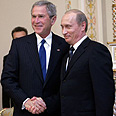
Bush and Putin – time to stop coaching and get in the game?
צילום: איי אף פי
All eyes on Gaza
Active international support needed to make Strip a success story
In the past few months both Israel and the Palestinians have been pushed close to their breaking points. The Israelis have faced intense societal strain caused by Israel's disengagement, and the Palestinians have suffered political in-fighting between the Palestinian Authority and Hamas and other opposition groups.
However, most of the statements coming from the United States have been along the lines of "it cannot be Gaza only", and have called for parties to return to the negotiating table and to the implementation of the Road Map soon after Disengagement.
The U.S. is like a sports coach – the players hobble over to the sidelines beaten and bruised, weary and exhausted, and the coach just pushes them back onto the field and says "Good job, now do it again!"
If the U.S. and the rest of the world truly want Israel and the Palestinians to get back into the game and return to the negotiating table, the next step is not for these two peoples to be pushed beyond their carrying capacities; rather it is for the international community to actively work towards the economic and political success of the Gaza Strip.
The responsibility should fall primarily on the shoulders of the international community for two main reasons. The first is that Israel, through disengagement, has fulfilled its obligations, in accordance with Phase I of the Roadmap, towards the Palestinians in the Gaza Strip.
Phase I calls for Israel to freeze settlements, to ease checkpoints, and to halt deportations and attacks on civilians, all of which Israel has done within the disengagement. The second reason is that international responsibility has a better chance of breaking the cycle of violence between the Israelis and Palestinians than does perceived continued Israeli control.
International community needs to get into game
A prosperous Gaza would be a significant first step in treating the current ills that face these two beleaguered societies. For the Palestinians, at the very least, a successful Gaza experiment will give the Gazans economic and political stability and highly improved living conditions.
For the Israelis, an internationally-supported, stable Gaza would allow Israel time to heal and would prove to the society that its sacrifice was not in vain.
The U.S. continuously calls for the Palestinian Authority to fight terror in accordance with the Road Map, but Abbas will not be able to fight off Hamas and other militant opposition who support terror if Gaza fails to become viable politically and economically.
Israel's main argument against returning to negotiations is that the Palestinian Authority has not done enough to fight terror and the terrorist infrastructure; again, a strong Gaza run by Abbas should make the PA much more effective in this regard.
Some Palestinians argue that if the international community focuses on building up the Gaza Strip now before they gain control of the West Bank, this will preclude the West Bank from becoming part of a future Palestinian state.
On the contrary, however, building up Gaza first will only make it easier for the Palestinians to gain control of the West Bank, as they will be able to establish themselves as a sovereign entity. In addition, learning how to build a strong and stable Gaza will make it easier for the Palestinians to build a strong and stable West Bank in the future.
Instead of trying to push the Israeli and Palestinian peoples into positions beyond what they themselves are able to currently handle, the international community needs to stop coaching from the sidelines and get into the game.










